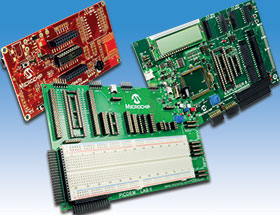

Microchip announced an expansion of the development platform for its growing portfolio of 8-bit PIC microcontrollers (MCU) with Core-Independent Peripherals (CIP). Designers can combine these building blocks to perform application functions autonomously, and they can be interconnected with an increasing amount of integrated, intelligent analog peripherals.
Because these functions are deterministically and reliably performed in hardware instead of software, CIPs enable system performance beyond traditional MCUs. They also enable customers to react quickly to changing market conditions with minimal code rewrites and very short validation cycles.
In order to further reduce development time with these MCUs, Microchip is releasing Version 3.0 of the MPLAB Code Configurator (MCC), the most recent version of its free graphical programming environment, and adding three new development boards.
The Curiosity Development Board is an entry-level, cost-effective tool that includes an integrated programmer and debugger in addition to options for easy external connectivity. The Explorer 8 Development Kit is a rapid proof-of-concept tool with extensive integration and support for the widest variety of 8-bit PIC MCUs. The PICDEM Lab II Development Board is a comprehensive development and experimentation tool, with an analog and mixed-signal focus.
All four of these tools are designed to fit within Microchip’s established, free MPLAB X Integrated Development Environment, and can be augmented via an ecosystem that includes development partners such as MikroElektronika and Digilent.
MPLAB Code Configurator minimises startup time by reducing burdensome datasheet research and code implementation, while the hardware CIPs eliminate the verification of functionality in complex control systems. Version 3.0 allows engineers to configure both individual peripherals and high-level system functions that combine several CIPs, in just a few mouse clicks.
MCC 3.0 also adds support for Microchip’s libraries, such as TCP/IP, custom LIN drivers and serial bootloaders, with future expansion plans for mTouch capacitive sensing, USB and RF protocols. Additionally, Microchip plans to release a software development kit (SDK) that will allow designers to add their own often-used 8- and 16-bit code snippets and/or libraries into MCC 3.0, for easy integration and configuration.
Curiosity development board
Curiosity is a cost-effective, fully integrated 8-bit development platform targeted at first-time users, makers and anyone seeking a feature-rich rapid prototyping board. It supports 8-bit PIC MCUs in 8-, 14- or 20-pin PDIP packages, and the board’s layout and external connections offer full access to each MCU’s Core-Independent Peripherals. External connectors include a mikroBUS header that supports more than 100 of MikroElektronika’s Click add-on boards, as well as a PCB footprint that enables users to easily add Microchip’s RN4020 Bluetooth LE module for communication.
Explorer 8 development kit
Explorer 8 enables a broad range of 8-bit MCU functions, including human interface, power conversion, Internet of Things, battery charging and many other applications. It also has the greatest capacity for expansion in Microchip’s 8-bit board lineup, with two Digilent Pmod interfaces, two MikroElectronika Click board sockets, and two expansion headers for custom add-on boards that designers can create as their development needs change. Explorer 8 also supports Microchip’s standard PICkit 3, MPLAB ICD 3 and MPLAB REAL ICE programmer/debuggers.
PICDEM Lab II development board
PICDEM Lab II is a development and teaching tool that gives users a large prototyping breadboard that enables them to easily experiment with different values and configurations of external analog signal conditioning and drive components for system optimisation. This flexibility eliminates the hassle and expense of building a custom PCB in the early stages of a project. The board is also modular, allowing users to design a system with one or several PIC MCUs simultaneously.
Off-chip connections can be made in any manner the user sees fit, and the off-board expansion possibilities include several industry-standard interfaces in addition to a system of configurable connectors. Connections include two MikroElektronika Click board sockets, a 16-pin LCD module connector, and a 20-pin custom header for custom add-on boards. Microchip provides several labs to assist users in getting started quickly, ranging from simple MCU configuration to power conversion and Class D audio.
For more information contact Shane Padayachee, Avnet South Africa, +27 (0)11 319 8600, [email protected], www.avnet.co.za

© Technews Publishing (Pty) Ltd | All Rights Reserved